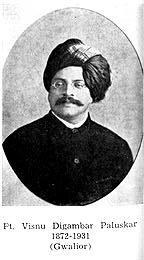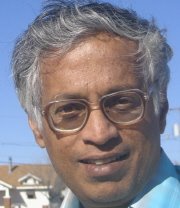Pandit Vishnu Digambar Paluskar, Guru of Gurus
Dr. K. Rohiniprasad


Today people can simply enrol themselves in any school of classical music and obtain degrees. This has been possible because of the foresight and untiring efforts of pioneers in the field like Vishnu Digambar Paluskar. Bringing it out of royal patronage, Paluskar made Hindustani music available to everyone. A commemorative stamp was issued in his name in 1973. It is unfortunate that there are no recordings of this great man’s music.
Vishnu, the son of a Keertankar named Digambar Gopal Paluskar, was born in 1872 at Kurundwad. From his childhood, Vishnu learnt singing and accompanied his father during concerts. During Datta Jayanti festivities, a bursting cracker blinded him permanently. Dr. Bhadbhade, who had tried in vain to save the boy’s eyes, arranged for music lessons with Balakrishna Bua Ichalkaranjikar, a teacher trained at
At Mathura he studied the Brij dialect thus improving his understanding of some of the finest compositions in Hindustani music. After his sojourns to
The activities of the school expanded as Paluskar founded a branch of the Mahavidyalaya in
With an attractive voice and musical sensitivity, Paluskar was a great musician and teacher, with uncompromising moral courage and awareness of the social values of art. He did not hesitate to prohibit smoking in his concerts even by maharajas. He amended the texts of some khayals when he considered it necessary and systematised the theory, notation system and syllabi of music lessons. Apart from countless music lovers, he was respected by the likes of Lala Lajpat Rai, Lokmanya Tilak, Gopala Krishna Gokhale, Mahatma Gandhi and Annie Besant. His Ram dhun, "Raghupati Raghava" was sung at the Dandi march in 1930. His "Vande mataram" was sung at every Congress session.
Out of Paluskar’s twelve children, only one, Dattatreya, survived. Unable to learn music from his father, who died when the boy was only eleven, Dattatreya was trained by his father’s disciples and rose to great eminence before his untimely demise in 1955.

4 Comments:
i have heard the mellifluous orcastristration of d.v paluskar but how can i listen vishnu digambar paluskar
Dear Saikat,
You can definitely find some recordings of the great maestro with All India radio.
no you can't. vishnu digambar paluskar was never recorded.
http://www.youtube.com/watch?v=ORPFjXxZzZs
Post a Comment
<< Home